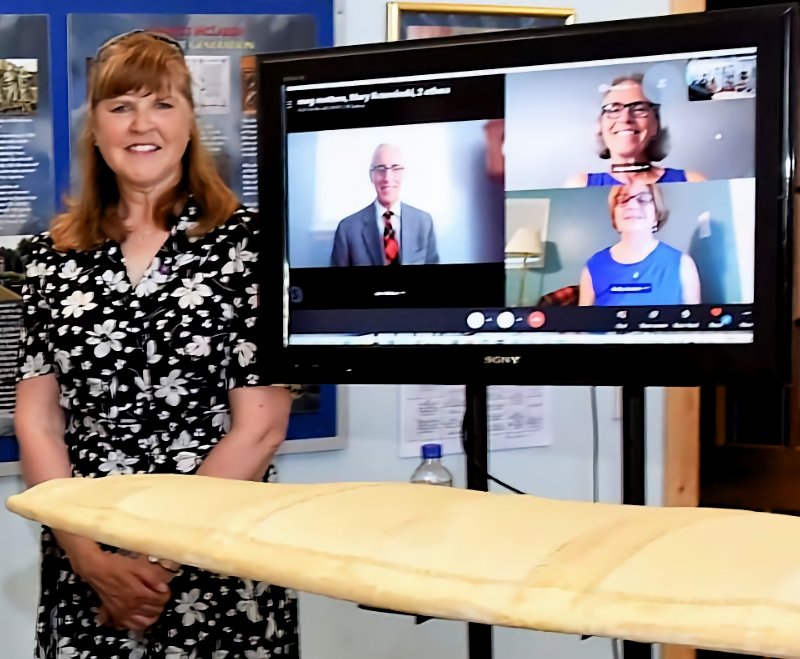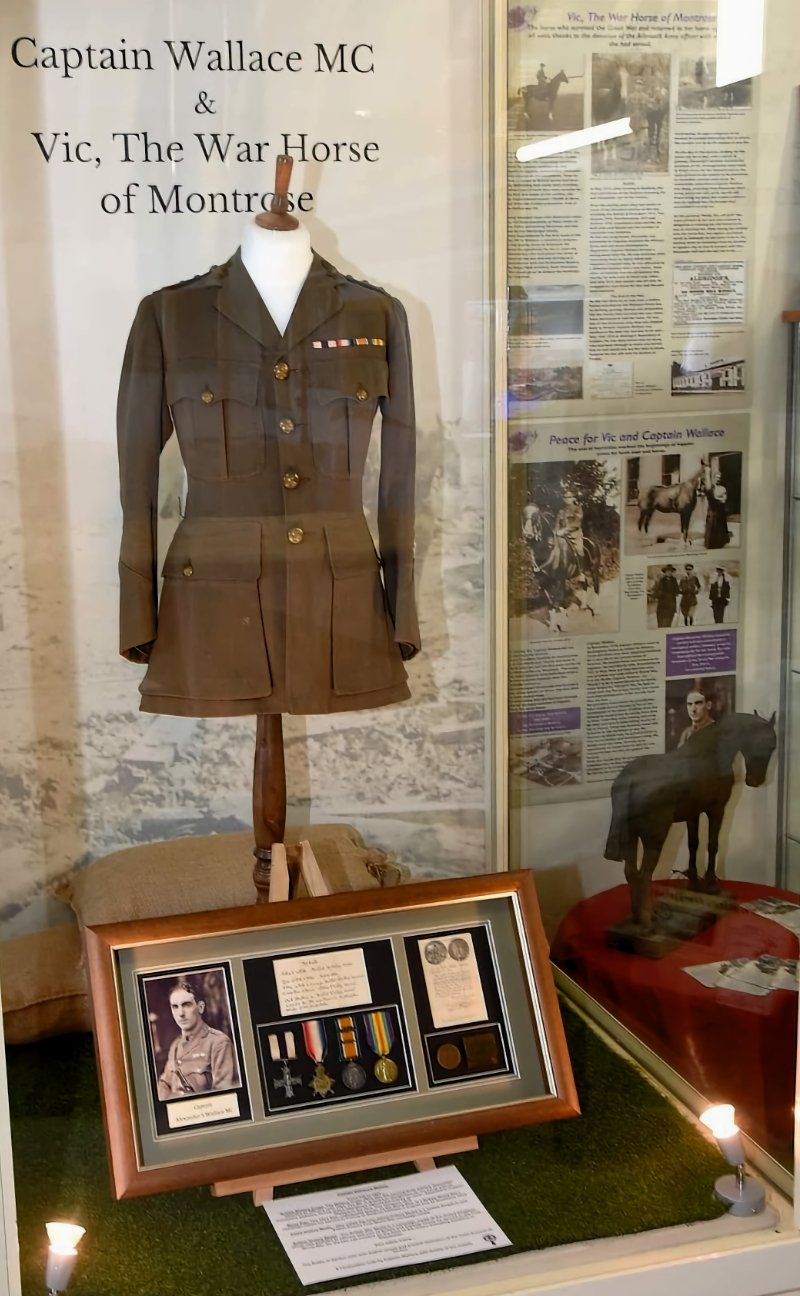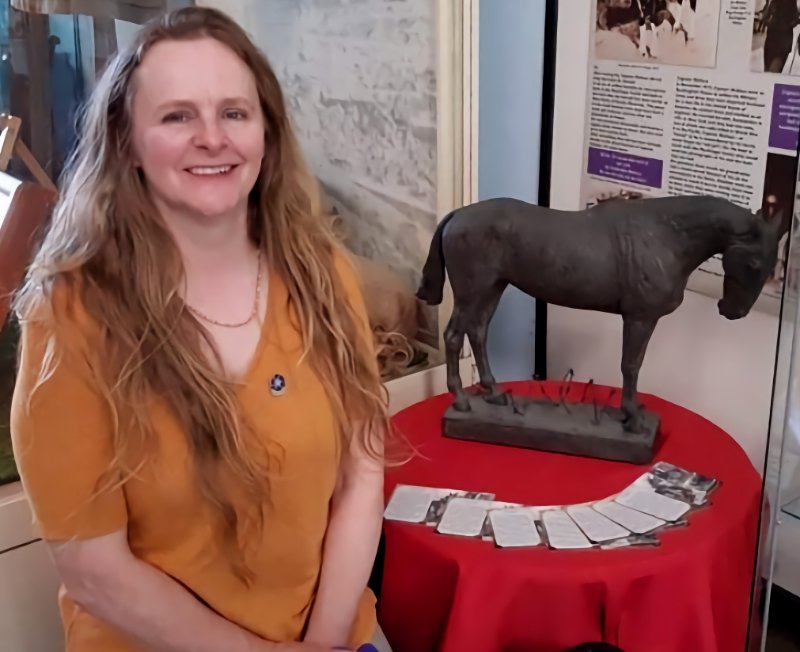29 – Vic The Faithful
The bond between soldier and horse can never be underestimated and it is demonstrated here in the story of Vic and Captain Wallace, sent to us by Sian Brewis. Sian is Volunteer/Director at Montrose Air Station Heritage Centre, in Scotland. She tells us “whilst recently doing research for a new display at the museum, my husband came across the story of Vic the war horse from Montrose on the Scotland’s War website. There was little more than a few lines about Vic and Captain Wallace who rode her throughout World War I. Following on from this, we have managed to trace Captain Wallace’s grandson, who lives in America. He is the proud owner of the photos of Vic and his grandfather from their time together in the War, which he kept all his life. Vic, obviously had a special place in his heart. I think this much overlooked story deserves to be told to a new generation and I nominate Vic for the 100 Hero Horses award.”
Vic’s story began in August 1914, within only a few days of the outbreak of World War I. She was commandeered from her home at Mains of Rossie, near Montrose, by the British Army, and served throughout the war with the Forfarshire Battery, the Royal Field Artillery, first with the 51st Division and later with the 14th Division.
Her story came to public attention when the Dundee Courier newspaper published on Tuesday, May 13, 1919, ARBROATH OFFICER AND HIS FAITHFUL STEED – Which Served Him for Four Years in France “Hullo, Vic, old girl!” The greeting was that of a gallant Scottish officer to the steed which during four years had shared with him many exciting adventures and miraculous escapes on the fields of France and Flanders. The battle experiences of the officer and his noble mount would sent a thrill of pride through every Forfarshire heart. They left the country together four years ago to play their part in the fight for freedom and liberty, and although several times parted during hostilities they finally re-joined each other on Saturday, when I witnessed their departure from London en route for their homes in Scotland.
The circumstances of the meeting were dramatic. Captain A. S. Wallace M.C. of the R.F.A. , is a native of Arbroath and, the son of Mr Wallace, veterinary surgeon of the town. An enthusiastic volunteer, he early responded to his country’s call. Vic was one of the many fine horses in the country mobilised for war and was acquired for the Government by the officer’s own father. Formerly she had led a peaceful life on the farm of Mains of Rossie, situated between Montrose and Arbroath. She was attached to the Forfarshire Battery of the R.F.A., to which Captain Wallace belonged, and went to France in May 1915. Since then Vic has carried her ride triumphantly through most of the fighting in which the 51st Division took part.
At Festubert in 1915, when the territorial battalions whacked the Prussian Guards, Vic was in the fray. On the Somme in 1916 she again distinguished herself. At the taking of Passchendaele in 1917 she was again with the Battery, and in the spring of last year when the Germans by a great drive threatened Amiens, Vic with her battery, put up a gallant fight.
The battery fought tenaciously, but the advance of the Germans was swift and ultimately a number of guns were either knocked out or had to be abandoned. The mare was the captain’s best friend in the retreat for so rapid was the enemy advance on this occasion that ten days elapsed before the remnants of the scattered unit came together again. The battery was reformed and Vic and her master covered themselves with glory in the final sweeping-up of the Huns in the Mons sector last year, which resulted in the surrender of the enemy.
Captain Wallace, in one of the battles was wounded and, being sent to hospital, was parted from his old friend. On recovery he was attached to another battery. A stroke of good fortune one day brought him again in touch with his favourite charger. Hearing of the proximity of his old battery to the part of the line where he was then stationed the captain rode over on a visit. Vic’s new master happened to be on the sick list, but the captain succeeded in effecting an exchange of mounts, and rode off with his old pal.
At the close of hostilities officers and men had regretfully to part with their favourite horses, and Vic was one of those destined to be sent home to England without her master. The War Office, however has displayed a sympathetic feeling in regard to the disposal of favourite horses.Officers receive official notification as to the date and place at which any such horse is to be sold in order that they may have an opportunity of acquiring old friends. In this way Captain Wallace learned in France that his charger was to be up for sale at Aldridges on Saturday last.
Determined that she should have a good home for the remainder of her days , the Captain wired to his brother, Lieut. Wallace at present stationed in London, and asked him to do his utmost to purchase the mare. Vic was numbered 75 in the list . She is a handsome, chestnut mare with four white stockings and fully ten years old. There was considerable competition, and as the price rose Vic’s fate hung in jeopardy. At 44 guineas there was a pause, but Lieut. Wallace, determined that his brother should not suffer disappointment, sent the price up another guinea, and joyfully marched off with the mare.
Arrangements were made at King’s Cross for her dispatch to Arbroath, and it was when Vic made her appearance on King’s Cross to be entrained that she was sighted by her overjoyed master. By a remarkable coincidence Captain Wallace was returning from France on short leave, and it was not until his favourite mare was being led along the station platform that he learned of his good fortune at the sale ring. At the greeting “Hullo, Vic, old girl!” the mare pricked up her ears and seemed as delighted at meeting her old friend as he was at securing his faithful and making sure that she would have a good home for the rest of her days. After directing that she should have a good feed of oats and seeing her comfortably settled in the horse box, the captain journeyed north by the same train resolutely declining pressing invitations from his brother to spend a day in London before travelling.
The report concluded: In May 1919 Vic returned to Arbroath, the only serving horse to do so, and was pensioned honourably at Rossie, where she was used for breeding, and became a regular prize-winner at shows. To read article which appeared in the Dundee Courier click here
Above left: Exhibition volunteer Sian Brewis and the video link with Captain Wallace’s Massachusetts-based grandson, John, along with other family members. Middle: Exhibit at Montrose Air Station Heritage Centre. Far right: War Horse Memorial representative, Lesley McKenzie from Aberdeen, with her maquette, a minature replica of our magnificent War Horse Memorial which stands in Ascot, Berkshire.





